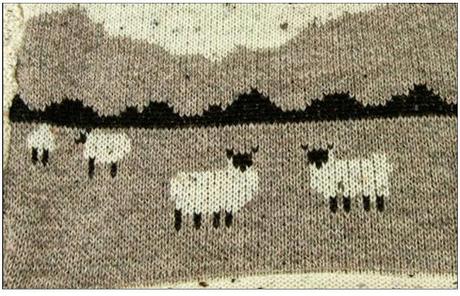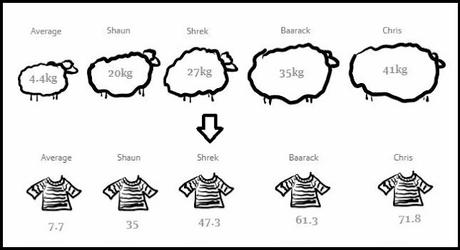So let me head off at a slight tangent and talk about a couple of legitimately wool-related things:-Thing the first is knitwear. I don't have much of it as I don't like to be too hot, and woolen items tend to be thick and on the prickly side. (Of course I'm excluding tangerine and white football scarves and hats.) I have a sleeveless pullover in natural 'black sheep' wool, in reality a mid grey; and a thicker 'sloppy joe' jumper in a darker 'black sheep' wool - though I haven't worn the latter this century as far as I can recall - must be a global warming signifier. They both came from the Black Sheep farm shop at Ingworth in Norfolk. I do love black sheep.I don't like bright woollens (football regalia excluded) and I hate knitwear with pictures on! You'll never catch me sporting a 'Christmas' jumper. They are anathema to me. đŸ˜˛

knitted in their own wool
Thing the second is the Merino sheep. I had always believed that sheep would shed their fleeces if they were not sheared - just as hairy cats moult in spring so as to be cooler in summer. I thought that was nature's design. Not so, apparently, with domesticated breeds of sheep. If they are not shorn in spring then one year's growth becomes two and so on. Of course that usually doesn't happen unless a sheep escapes and goes rogue. It has been a particular and attention grabbing problem with a series of Merino sheep in Australia. The Merino has a naturally dense and soft fleece, for which it is prized. So much so that in Spain where it originated, there was a strict law for centuries preventing its export. However the world moved on and now Merinos and Merino crosses are found on every continent, including the antipodes.The problem for Australian Merinos when they stray off into the wild is that distances are so vast, there is a good chance they won't be relocated again for years, if ever - and in the wilderness of the outback their fleeces just keep on growing...and growing...and growing - to the point that they become so thick and heavy the poor sheep can hardly breathe, let alone move.
There have been a few cases of monster Merinos being found after years in the Australian Wilds and they required not only shearing but medical attention and rehabilitation for weakened joints. Take a look at the graphic below. When one considers that an average Merino fleece weights about 4.5 kilos, the fleeces taken from famous 'back from the wild' Merinos like Shaun, Shrek, Baarack and Chris (yes, they all get good press and pet names) have weighed in at between 20kilos and 41kilos - suggesting that they've gone between five and ten years without being shorn. And there may have been even weightier ones who've just collapsed under 50 kilo fleeces and died lonely Merino deaths undiscovered in the outback.

monster Merinos and their yield
The quantity of good yarn an average Merino yields would be enough to knit seven natty jumpers. The quantity taken from the back of Chris weighed in as the world's heaviest fleece at 41 kilos and would have furnished enough yarn to knit over seventy jumpers. I thought you'd like to know that. If you want to see pictures of Shaun, Shrek, Baarack or Chris just Google e.g. 'Chris the Merino sheep'. I didn't want to post the pictures on my blog as they may have upset the readership.I'll cast off with another new poem, ripe for a re-knitting probably:
Unravelling
Hard to know when the snag occurred. Unremarked that first catching at the hem and you walked away never once looking back although you clearly guessed, as you overstepped at intervals the trail of thread, that you were unravelling upwards as you went. Maybe you thought you'd get free of it all one day? Who's to know and who's to say? It took years of course but in the end when once unwound to its full extent except for the collar knotted at your neck which tightened in a noose, your eyes blazed terror like a spooked horse as you kept on walking till you choked and fell - but with such composure and singularity of purpose at the death. Thanks for reading. Stay warm, S ;-) Email ThisBlogThis!Share to TwitterShare to Facebook
